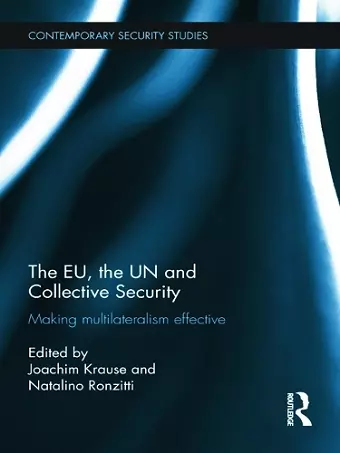The EU, the UN and Collective Security
Making Multilateralism Effective
Joachim Krause editor Natalino Ronzitti editor
Format:Hardback
Publisher:Taylor & Francis Ltd
Published:23rd Apr '12
Currently unavailable, and unfortunately no date known when it will be back
This hardback is available in another edition too:
- Paperback£45.99(9780415741156)

This book examines the effectiveness of multilateralism in ensuring collective security and, in particular, the EU’s role in this process.
In 1992, shortly after the end of the Cold War, a Security Council Summit in New York reaffirmed the salience of the system of collective security and stated the determination of the Heads of State to maintain it as the prime international instrument for preserving peace. Twenty years later, however, the record of collective security as well as of multilateralism has not been very encouraging. The system of collective security, as enshrined in the United Nations (UN) Charter, failed repeatedly to accomplish its mandate in the 1990s and has led to controversial debates in the United States and Europe that reached a climax during the Iraq crisis in 2002/03.
The volume draws upon both theoretical and empirical research to answer the following core questions:
- What are the reasons that have made multilateralism either effective or ineffective in the field of peacekeeping, peace preservation and peacebuilding?
- How can multilateralism be made more effective?
- How can attempts made by Europe to render UN multilateralism in the security area more efficient be assessed?
This book will be of much interest to students of peacebuilding/peacekeeping, EU policy, the UN, security studies and IR in general.
"A work, in the complex, rich in problematic points, to each of which correspond accurate examination and analysis of situations." - Giorgio Bosco (2012)
ISBN: 9780415699174
Dimensions: unknown
Weight: 710g
296 pages